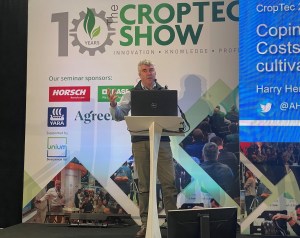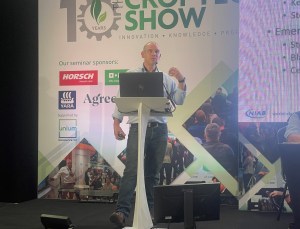Written by CPM Magazine from CPM Magazine
Download PDF
Farmers have a lot to contend with at the moment and getting to grips with the uncertainty they face can be challenging. CPM attended the BCPC Congress and the CropTec Show in November to get an update.
By Melanie Jenkins
There’s no denying that UK farmers are facing challenging times, be that from financial pressure or regulatory reform, but getting to grips with just what those challenges are can be the means to planning for them.

Speaking at the BCPC congress, Nick von Westenholz detailed how economic, trade and regulatory pressures are impacting UK farmers.
Speaking at the British Crop Production Council (BCPC) congress in Harrogate, Nick von Westenholz of the NFU took the opportunity to focus on the prospects for UK farmers in the coming months and years. “There are challenges caused by a considerable amount of uncertainty in the farming sector at present, but that doesn’t mean there aren’t opportunities as well. Uncertainty seems to be a sort of buzz word.”
He points out that there are three really major areas that demonstrate where the uncertainty is coming from. “The first is economic pressures, primarily caused by the conflict in Ukraine. However, energy prices were on an upward trajectory prior to this,” he says.
“It’s clear that this has had a huge impact on the economy and on the farming economy in particular. And the COVID pandemic has also contributed to this.”
The second area causing uncertainty is the situation regarding international trade, says Nick. “There are tensions in the UK’s approach to international trade, which itself is pretty conflicted, because we have a very different approach to the rest of the world than we do with the EU. And there’s also conflicting domestic policy.”

After transferring all EU law into British law, the government has set a deadline for all laws to be proactively amended or they expire.
The final point Nick raised regarded a really important piece of Brexit regulation. “One of the big issues during the referendum was sovereignty – taking back control and having the ability to do things differently. I think from a business perspective, this was one of the more attractive aspects, although we haven’t really seen it happen yet.
“But there’s quite a lot going on behind the scenes and we may suddenly be in the middle of a maelstrom of potential regulatory reform.”
Diving a little deeper into the topic of economic pressure, Nick highlights that although farmers are facing rising inflation, there are strong commodity prices in the sector, especially arable. “But agricultural inflation is huge. Inflation in the economy is 13.2% as of September 2022, but agriculture input inflation is actually up at about 20% and fertiliser has, at times, peaked at about four times inflation over the past 12 months. Plus, there’s energy, fuel and feed prices and the physical availability of some of these products.”
On the back of this, there’s been an increase in requests for bank finance as cash is a bit hard to come by, he says. “I think banks have generally been quite positive about meeting the requests to provide finance though.”
Arable farmers have also been changing their cropping to help managed their finances. “We found that a third of arable growers changed their cropping plans a few months before a survey we conducted in the summer. These were varied but a major one was switching from milling wheat to feed due to fertiliser requirements. It’ll be interesting to see what the impact of this will be on next year’s harvest.”
And although Nick points out that the natural gas price has come down significantly in the past few months, it’s still historically high. This has combined with political developments having a big impact on the exchange rate. “The geopolitical issues are really contributing to the volatility and uncertainty.”
Moving onto trade policy, Nick feels that this is proving unhealthy for UK farmers to forward plan. “The government has made some quite bold claims about how many trade deals it has done since leaving the EU; claiming around 70, but nearly all of these are rollover from deals we had when we were a member state. The only two real trade deals we’ve done are with Australia and New Zealand which many aren’t particularly happy with because they are liberalising deals allowing these countries to send commodities to the UK in whatever volumes they like.
“The potential downsides from them to UK farmers could be significant, injecting a lot of competition and putting downward pressure on prices,” explains Nick. “There are almost no upsides because there are hardly any tariffs on exports into Australia and New Zealand, so doing a trade deal hasn’t changed things for the UK.”
However, the UK is negotiating deals with a number of other countries. “India, Canada and Mexico we have rollover trade deals with, but we’re going to expand on these. Then there’s the Gulf Cooperation Council and CPTPP, which is the Comprehensive and Progressive Agreement Trans-Pacific Partnership. We’re also about to kick off talks with Switzerland and Israel and there may be a few others. However, things with the USA are still stalled.”
Speaking to Department of International Trade a few years ago, the NFU asked how the government expected UK farmers to compete with the new imports to the UK market, explains Nick. “We were told that the government thought UK farmers would increase their productivity 2% year-on-year, which would, by their modelling, allow for competitiveness. But when we asked to see this modelling, they didn’t have it at all. It was more a case of ‘if’. They’ve taken this step without developing the domestic policies to enable farmers to improve productivity and compete.
“So a major part of our lobbying is aimed at tackling this and we are starting to get through,” he says.
To wrap up his talk, Nick turned his attention to regulatory reform since leaving the EU. “In summary, there’s a lot of noise and very little action. But an important part of the EU Withdrawal Act and the EU Withdrawal Agreement was creating retained EU law, which lifted all of the EU law and created a new category of law here,” says Nick.
“Since then we’ve had opportunities to reform regulations but there hasn’t been a huge amount of progress, except with gene editing. But a few weeks back we had the publication of the Retained EU Law Bill which sunsets all retained EU law by the end of next year. This means that if civil servants or ministers don’t do something proactively with these laws, they fall away and are no longer law.
“Ministers can extend these by almost three years, but mostly they have powers, just with the stroke of a pen, to revoke, modify or reinstate any regulations. You can see the jeopardy of this approach and it creates uncertainty,” warns Nick.
“There’s an opportunity for a systemic process, but because of the extraordinarily tight deadline there’s a risk that important regulations may fall by the wayside and we’ll miss the opportunity to do a proper job.”
Harnessing efficiencies
Harnessing efficiencies was a key theme of the seminars at the CropTec Show 2022 in Peterborough, with a central focus on fertiliser and sustainable practices, which was likely of little surprise to attendees based on the past year.

CropTec 2022 was all about harnessing efficiencies to become sustainable in a constantly changing environment.
Although Defra didn’t have a lot to add to what’s already known about the Sustainable Farming Incentive at the show, Caroline Nicholls of the Future Farming and Countryside Programme, reiterated its intention to invest in and support farm businesses. “We are changing how we work with farmers to make things fair, more workable, flexible, successful and proportionate.”
One aspect of the new schemes Caroline was particularly keen to highlight was how inspectors plan to take a very different tact to what many have experienced with the RPA to date. “We want to work with farmers and offer them advice so they’re able to meet the requirements.
“Farming is going through one of the biggest changes in a generation and we want our inspectors to offer guidance. It’s about supporting businesses, achieving environmental and animal health and welfare goals,” she says.

Harry Henderson says that change has always happened in agriculture, and it always will.
Harry Henderson of AHDB points out that change has always happened in agriculture, and it always will, but there’s likely tougher times ahead. Speaking about farm businesses, he explains that the middle 50% of performers saw costs increase 6% on average in the five years to 2021. “In 2022, costs rose 15% and it’s predicted to be up 32% for the crops harvested in 2023. And although the net margin for winter wheat could increase by 80% for 2022, this is predicted to fall 60% for 2023.
“So how are we going to save money? Is it regenerative agriculture? There’s a lot of peer pressure on social media about how it should be taken up wholesale without a fear of failure.”
He believes that having integrated pest management and integrated farm management implemented on farm are key to starting the process. “These are entries to the more holistic type of farming, but uptake must be linked to maintaining costs. And looking after the soil has to underpin reducing fertiliser costs and lower crop production costs, as well as minimised fuel use and machinery costs.”
One such area of focus given a lot of attention in the seminar programme was the optimisation and reduction of fertiliser usage.
And while Matt Culley of the NFU flags that all growers are at different stages of technology adoption in their fertiliser application, Mark Tucker of Yara stressed that growers don’t have to try to adopt every piece of technology available. “But if you go into it, remember that it’s about gathering data to make informed decisions. Start by knowing your soil fertility and how this impacts crop nutrition and then you can manage the crop throughout the season.”

A lot of discussion at CropTec centred around nitrogen use and how to manage it more efficiently.
Measuring nitrogen use efficiency is a useful tool to help tailor N use across fields or the farm, he suggests. “Calculating this is a basic input versus output equation.”
Tissue testing is another useful tool to help gather data. “The crop can tell you where there’s variability, so that will prompt you to ask why you aren’t applying N variably. In a year where the price of fertiliser has gone from 65p/kg to 222p/kg, why haven’t more growers adopted better N management?”
But fertiliser isn’t the only area where application practices may require some adjustment in future. Pesticides were another area of concern voiced at the show, be that from the threat of increased regulation, loss of authorised products or from reduced efficacy.
“In the past 10 years we have lost a lot of pesticides,” states Andrew Watson of NIAB. “Close to 500 products in all – about 50% of what we had.”
With key actives such as tebuconazole under threat, and likely to lose authorisation within three years, growers could face some challenges in controlling diseases such as rusts, says Andrew. “The loss of tebuconazole will be a blow and it will push fungicide costs up, so varietal resistance is going to be very important.”
But breeding resistant varieties is not easy, says Andrew’s colleague, Dr Phil Howell. “Genetic resistance is an arms race; we breed in resistance and new races of the pathogens frequently overcome it.”

Genetic resistance is an arms race, according to Dr Phil Howell.
And to add to the pressure, Phil is convinced that the time of the multi-site is going to come to an end. “These are much harder to break down in soils and once one has been labelled as an endocrine disruptor this may stop future investment.”
There’s also a steady decline in efficacy of some plant protection products and reports of diseases such as stem rust reaching winter wheat trials in the UK – a disease never seen here before, he adds.
But it’s not all doom and gloom. “There’s more emphasis on resistance and untreated yield in new varieties on the AHDB Recommended List now,” says Andrew. “Variety blends could also be a tool to help growers, but do check with your buyer first. Farmers in Canada have been using a refuge system where the second variety in a blend is there to provide a home for pests such as Orange Wheat Blossom Midge.
“And new technologies such as gene editing offer great promise. There may be some problems that can only be addressed with this,” he adds.

Growers could face more challenges from diseases as actives continue to be lost from the arsenal.
Another big talking point at the show was natural capital and how and why it should be adopted on farm to benefit farmers and the environment. According to George Cook of Andersons: “The tide is shifting, and we have to get used to managing land differently and exploring the options of natural capital.”
He points out that the soil ecosystem is an essential part of natural capital. “Everything you put on to soil has to be processed by it. But getting carbon into that soil has a lot of significance as it has benefits to the bottom line of businesses.”
And this is what the supply chain is interested in supporting on farms at the moment, says Nigel Davies of MaltDoctor. “The consumer wants the sustainable raw materials, and some parts of the supply chain will pay a premium for those types of products.”
This article was taken from the latest issue of CPM. For more articles like this, subscribe here.
The post Managing uncertainty appeared first on cpm magazine.
Continue reading on CPM website...
If you are enjoying what you read then why not considering subscribing here: http://www.cpm-magazine.co.uk/subscribe/
Download PDF
Farmers have a lot to contend with at the moment and getting to grips with the uncertainty they face can be challenging. CPM attended the BCPC Congress and the CropTec Show in November to get an update.
“The government has made some quite bold claims about how many trade deals it has done since leaving the EU.”
By Melanie Jenkins
There’s no denying that UK farmers are facing challenging times, be that from financial pressure or regulatory reform, but getting to grips with just what those challenges are can be the means to planning for them.

Speaking at the BCPC congress, Nick von Westenholz detailed how economic, trade and regulatory pressures are impacting UK farmers.
Speaking at the British Crop Production Council (BCPC) congress in Harrogate, Nick von Westenholz of the NFU took the opportunity to focus on the prospects for UK farmers in the coming months and years. “There are challenges caused by a considerable amount of uncertainty in the farming sector at present, but that doesn’t mean there aren’t opportunities as well. Uncertainty seems to be a sort of buzz word.”
He points out that there are three really major areas that demonstrate where the uncertainty is coming from. “The first is economic pressures, primarily caused by the conflict in Ukraine. However, energy prices were on an upward trajectory prior to this,” he says.
“It’s clear that this has had a huge impact on the economy and on the farming economy in particular. And the COVID pandemic has also contributed to this.”
The second area causing uncertainty is the situation regarding international trade, says Nick. “There are tensions in the UK’s approach to international trade, which itself is pretty conflicted, because we have a very different approach to the rest of the world than we do with the EU. And there’s also conflicting domestic policy.”

After transferring all EU law into British law, the government has set a deadline for all laws to be proactively amended or they expire.
The final point Nick raised regarded a really important piece of Brexit regulation. “One of the big issues during the referendum was sovereignty – taking back control and having the ability to do things differently. I think from a business perspective, this was one of the more attractive aspects, although we haven’t really seen it happen yet.
“But there’s quite a lot going on behind the scenes and we may suddenly be in the middle of a maelstrom of potential regulatory reform.”
Diving a little deeper into the topic of economic pressure, Nick highlights that although farmers are facing rising inflation, there are strong commodity prices in the sector, especially arable. “But agricultural inflation is huge. Inflation in the economy is 13.2% as of September 2022, but agriculture input inflation is actually up at about 20% and fertiliser has, at times, peaked at about four times inflation over the past 12 months. Plus, there’s energy, fuel and feed prices and the physical availability of some of these products.”
On the back of this, there’s been an increase in requests for bank finance as cash is a bit hard to come by, he says. “I think banks have generally been quite positive about meeting the requests to provide finance though.”
Arable farmers have also been changing their cropping to help managed their finances. “We found that a third of arable growers changed their cropping plans a few months before a survey we conducted in the summer. These were varied but a major one was switching from milling wheat to feed due to fertiliser requirements. It’ll be interesting to see what the impact of this will be on next year’s harvest.”
And although Nick points out that the natural gas price has come down significantly in the past few months, it’s still historically high. This has combined with political developments having a big impact on the exchange rate. “The geopolitical issues are really contributing to the volatility and uncertainty.”
Moving onto trade policy, Nick feels that this is proving unhealthy for UK farmers to forward plan. “The government has made some quite bold claims about how many trade deals it has done since leaving the EU; claiming around 70, but nearly all of these are rollover from deals we had when we were a member state. The only two real trade deals we’ve done are with Australia and New Zealand which many aren’t particularly happy with because they are liberalising deals allowing these countries to send commodities to the UK in whatever volumes they like.
“The potential downsides from them to UK farmers could be significant, injecting a lot of competition and putting downward pressure on prices,” explains Nick. “There are almost no upsides because there are hardly any tariffs on exports into Australia and New Zealand, so doing a trade deal hasn’t changed things for the UK.”
However, the UK is negotiating deals with a number of other countries. “India, Canada and Mexico we have rollover trade deals with, but we’re going to expand on these. Then there’s the Gulf Cooperation Council and CPTPP, which is the Comprehensive and Progressive Agreement Trans-Pacific Partnership. We’re also about to kick off talks with Switzerland and Israel and there may be a few others. However, things with the USA are still stalled.”
Speaking to Department of International Trade a few years ago, the NFU asked how the government expected UK farmers to compete with the new imports to the UK market, explains Nick. “We were told that the government thought UK farmers would increase their productivity 2% year-on-year, which would, by their modelling, allow for competitiveness. But when we asked to see this modelling, they didn’t have it at all. It was more a case of ‘if’. They’ve taken this step without developing the domestic policies to enable farmers to improve productivity and compete.
“So a major part of our lobbying is aimed at tackling this and we are starting to get through,” he says.
To wrap up his talk, Nick turned his attention to regulatory reform since leaving the EU. “In summary, there’s a lot of noise and very little action. But an important part of the EU Withdrawal Act and the EU Withdrawal Agreement was creating retained EU law, which lifted all of the EU law and created a new category of law here,” says Nick.
“Since then we’ve had opportunities to reform regulations but there hasn’t been a huge amount of progress, except with gene editing. But a few weeks back we had the publication of the Retained EU Law Bill which sunsets all retained EU law by the end of next year. This means that if civil servants or ministers don’t do something proactively with these laws, they fall away and are no longer law.
“Ministers can extend these by almost three years, but mostly they have powers, just with the stroke of a pen, to revoke, modify or reinstate any regulations. You can see the jeopardy of this approach and it creates uncertainty,” warns Nick.
“There’s an opportunity for a systemic process, but because of the extraordinarily tight deadline there’s a risk that important regulations may fall by the wayside and we’ll miss the opportunity to do a proper job.”
Harnessing efficiencies
Harnessing efficiencies was a key theme of the seminars at the CropTec Show 2022 in Peterborough, with a central focus on fertiliser and sustainable practices, which was likely of little surprise to attendees based on the past year.

CropTec 2022 was all about harnessing efficiencies to become sustainable in a constantly changing environment.
Although Defra didn’t have a lot to add to what’s already known about the Sustainable Farming Incentive at the show, Caroline Nicholls of the Future Farming and Countryside Programme, reiterated its intention to invest in and support farm businesses. “We are changing how we work with farmers to make things fair, more workable, flexible, successful and proportionate.”
One aspect of the new schemes Caroline was particularly keen to highlight was how inspectors plan to take a very different tact to what many have experienced with the RPA to date. “We want to work with farmers and offer them advice so they’re able to meet the requirements.
“Farming is going through one of the biggest changes in a generation and we want our inspectors to offer guidance. It’s about supporting businesses, achieving environmental and animal health and welfare goals,” she says.

Harry Henderson says that change has always happened in agriculture, and it always will.
Harry Henderson of AHDB points out that change has always happened in agriculture, and it always will, but there’s likely tougher times ahead. Speaking about farm businesses, he explains that the middle 50% of performers saw costs increase 6% on average in the five years to 2021. “In 2022, costs rose 15% and it’s predicted to be up 32% for the crops harvested in 2023. And although the net margin for winter wheat could increase by 80% for 2022, this is predicted to fall 60% for 2023.
“So how are we going to save money? Is it regenerative agriculture? There’s a lot of peer pressure on social media about how it should be taken up wholesale without a fear of failure.”
He believes that having integrated pest management and integrated farm management implemented on farm are key to starting the process. “These are entries to the more holistic type of farming, but uptake must be linked to maintaining costs. And looking after the soil has to underpin reducing fertiliser costs and lower crop production costs, as well as minimised fuel use and machinery costs.”
One such area of focus given a lot of attention in the seminar programme was the optimisation and reduction of fertiliser usage.
And while Matt Culley of the NFU flags that all growers are at different stages of technology adoption in their fertiliser application, Mark Tucker of Yara stressed that growers don’t have to try to adopt every piece of technology available. “But if you go into it, remember that it’s about gathering data to make informed decisions. Start by knowing your soil fertility and how this impacts crop nutrition and then you can manage the crop throughout the season.”

A lot of discussion at CropTec centred around nitrogen use and how to manage it more efficiently.
Measuring nitrogen use efficiency is a useful tool to help tailor N use across fields or the farm, he suggests. “Calculating this is a basic input versus output equation.”
Tissue testing is another useful tool to help gather data. “The crop can tell you where there’s variability, so that will prompt you to ask why you aren’t applying N variably. In a year where the price of fertiliser has gone from 65p/kg to 222p/kg, why haven’t more growers adopted better N management?”
But fertiliser isn’t the only area where application practices may require some adjustment in future. Pesticides were another area of concern voiced at the show, be that from the threat of increased regulation, loss of authorised products or from reduced efficacy.
“In the past 10 years we have lost a lot of pesticides,” states Andrew Watson of NIAB. “Close to 500 products in all – about 50% of what we had.”
With key actives such as tebuconazole under threat, and likely to lose authorisation within three years, growers could face some challenges in controlling diseases such as rusts, says Andrew. “The loss of tebuconazole will be a blow and it will push fungicide costs up, so varietal resistance is going to be very important.”
But breeding resistant varieties is not easy, says Andrew’s colleague, Dr Phil Howell. “Genetic resistance is an arms race; we breed in resistance and new races of the pathogens frequently overcome it.”

Genetic resistance is an arms race, according to Dr Phil Howell.
And to add to the pressure, Phil is convinced that the time of the multi-site is going to come to an end. “These are much harder to break down in soils and once one has been labelled as an endocrine disruptor this may stop future investment.”
There’s also a steady decline in efficacy of some plant protection products and reports of diseases such as stem rust reaching winter wheat trials in the UK – a disease never seen here before, he adds.
But it’s not all doom and gloom. “There’s more emphasis on resistance and untreated yield in new varieties on the AHDB Recommended List now,” says Andrew. “Variety blends could also be a tool to help growers, but do check with your buyer first. Farmers in Canada have been using a refuge system where the second variety in a blend is there to provide a home for pests such as Orange Wheat Blossom Midge.
“And new technologies such as gene editing offer great promise. There may be some problems that can only be addressed with this,” he adds.

Growers could face more challenges from diseases as actives continue to be lost from the arsenal.
Another big talking point at the show was natural capital and how and why it should be adopted on farm to benefit farmers and the environment. According to George Cook of Andersons: “The tide is shifting, and we have to get used to managing land differently and exploring the options of natural capital.”
He points out that the soil ecosystem is an essential part of natural capital. “Everything you put on to soil has to be processed by it. But getting carbon into that soil has a lot of significance as it has benefits to the bottom line of businesses.”
And this is what the supply chain is interested in supporting on farms at the moment, says Nigel Davies of MaltDoctor. “The consumer wants the sustainable raw materials, and some parts of the supply chain will pay a premium for those types of products.”
This article was taken from the latest issue of CPM. For more articles like this, subscribe here.
The post Managing uncertainty appeared first on cpm magazine.
Continue reading on CPM website...
If you are enjoying what you read then why not considering subscribing here: http://www.cpm-magazine.co.uk/subscribe/





